About the time that the Weather Underground was forming and
gaining infamy for their sometimes violent protests, Robert Redford
was well on his way to becoming one of the biggest stars in Hollywood.
Butch Cassidy & the Sundance Kid, Downhill Racer and
Jeremiah Johnson were all released during the group's heyday. Redford was familiar with the
generational revolt
going on in the late 60s and early 70s. However, he was a part of a
different world: a young family man whose career was starting to
explode. Still he was always sympathetic to the youthful causes and
that fascination has led 40 years later to his latest film, The
Company You Keep.
The film is directed by and starring Redford as Jim Grant,
a long-time small-town lawyer who is exposed as a former member of
the Weather Underground. He had settled down after being on
the run for 40 years since a protest went wrong, leading to a bank
guardís death. When one of his cohorts (Susan Sarandon) is captured by the FBI and a
reporter (Shia LaBeouf) starts sniffing around him, Grant must drop
his young step-daughter (singer Jackie Evancho, making her acting
debut) with his brother (Chris Cooper) and go back on the run.
However, this time, Grant isnít running away. He is
running back to his past to track down old friends from the
movement, particularly the one woman who can prove his innocence
(Julie Christie). In the meantime, LaBeoufís reporter and the FBI
are on his tail, finding his old secrets and the grown daughter he
had to leave behind (Brit Marling).
The movie takes a fascinating look at the hippie era
and its reverberations into today's world. The Company You
Keep shows a nostalgia for the ideals of peace and love, but
also takes a hard look at the wrongs committed by the Weather
Underground, a rogue faction that sometimes used violence to make
their points.
A few days before the filmís New York and Los
Angeles
debut, we were invited when Redford, Tucci, Marling and Evancho held a press conference
to discuss their film and their feelings about the sixties movements
that inspired it.
What drew you to
the material? Had you read Neil Gordonís novel or was it Lem Dobbsí
screenplay that attracted you to this?
Robert Redford:
It was
the book. I read
that five or six years ago. I was drawn to the book because itís a big, wide-ranging book. It
had a lot of plot lines. It had a lot of email stuff going on. It
had many, many characters. There was something at the core that
captured my attention, and so the next four to five years was spent
shaping that material into what could be a film. So yeah, I was
drawn to the material. Thatís what started it. For the whole other
reasoning that I wonít get into, but thatís how it started. Then Lem Dobbs came as a result of hiring him to write the screenplay.
Thatís how that came about. Then it was many, many iterations. It
was reshaped and reshaped and reshaped. Kind of sculpted.
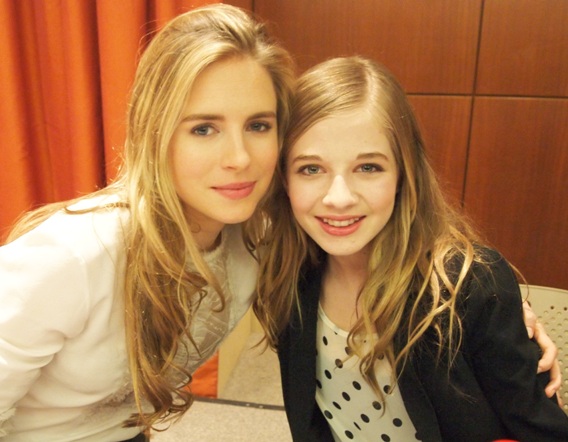 Brit,
youíve starred in idiosyncratic independent films like
Another Earth and The Sound of My Voice, both of
which you co-wrote. Is there much difference between the
low-budget indie films and bigger, star-driven films?
Brit,
youíve starred in idiosyncratic independent films like
Another Earth and The Sound of My Voice, both of
which you co-wrote. Is there much difference between the
low-budget indie films and bigger, star-driven films?
Brit Marling:
I guess in some respects there are differences. I mean, the craft
service table is a different craft service table. (chuckles)
Honestly, for me it always comes down to the story. How attracted
you are to the story and how compelled you are to be a part of
telling it. When I read the script, I was really moved by the
Weather Underground and how itís not set back then. Itís set in
present day. This group has come into age and wisdom and experience
and are looking back and are wondering about the radicalism of their
youth. If they made the right choices and would they do it
differently now. My generation is grappling with a lot of the same
ideas so I was very attracted to that part of the story.
Stanley Tucci: I
think that is something universal...
Robert Redford:
We were overjoyed to launch her first film and her second
one Ė Another Earth and The Sound of My Voice Ė at the
Sundance festival. Thatís how I came to know Brit. The whole idea
was: her work was really, really special and I thought well someway,
somehow, sometime Iím going to find a way to work with her. I was
very motivated by what I had already seen, so it was a particular
joy for me to be able to invite her into this film.
Brit Marling:
I
should add to that the fact that I may be able to make a living as
an actress and writer I owe entirely to this man. And to the
institution he created as a safe haven for artists and filmmakers to
make quirky, independent releases. Without that I donít know, I
might be investment banking. Who knows what I might be doing right
now?
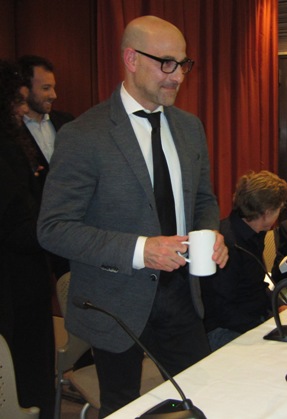 Stanley,
your character is part of the wonderful Hollywood tradition of
hard-boiled newspaper editors. How did you approach the character?
Stanley,
your character is part of the wonderful Hollywood tradition of
hard-boiled newspaper editors. How did you approach the character?
Stanley Tucci: I
have to say it was all there on the page. It was very well written,
very well realized in the script. I donít know that I had to do
that much. I had Shia [LaBeouf] and that energy to work off of and
Bobís very clear and succinct direction. So our rehearsal really
was minimal for the most part. Shia and I worked one day and then
we went in and did it. The scenes are very straightforward. He is
the classic, curmudgeonly, exhausted editor. I think particularly
in this day and age heís an interesting character, because heís the
last of a dying breed. You donít see those guys so much anymore.
Robert Redford:
I
wanted to add a few words about umÖ Stanley. Stanley. (They
both laugh) My dear friend whatís-his-name. Stanley and I have
had some history together we go a ways back. Like Brit, obviously
Iím very indebted to people who come in for no money at all. Who
come in and help me with the non-profit Sundance Institute. Stanley
was one of the first advisors we ever had. He gave his time in a
crucial point in our development. Thatís how Stanley and I got to
know each other, and then his first film he directed [Big Night]
was a joy to me. Over the years, Stanley and I have engaged at
different points and different times. To be able to cast Stanley...
one of the great honors that Iím able to share with you all is that
this is a wonderful cast. Iím blessed with my colleagues coming
onboard. Because look, letís face it, thereís no money in film
these days. Itís shrunk down to a nub. You have to depend on the
kindness of not strangers but of colleagues to come in and help
you. I was blessed by having a wonderful cast, but certainly
Stanley and Brit and Jackie. Stanley coming in, he didnít have to, there was nothing in it for him. Except the joy of working with me.
(laughs) There was nothing for him. To show you what a pro
he is, he came in and he didnít need any rehearsal, because he is
such a well-crafted actor. He so understood the part. What got
me... I just want to add something... he talks about the energy, Shiaís energy which is extreme. Shia has a fast mind and a fast
tongue. For Stanley to work with that and still be the character
that he had to play, he had to be a man in control within an
industry that was going out of control. It had its own thing, its
own dynamic. The fact that he could manage the energy by creating a
counter energy as Shia got more crazed, if you watch the film,
Stanley went the other way so it creates a dynamic. When Shia slows
down Stanley goes for his throat. I just enjoyed watching it. I
didnít have anything to do with it.
Maybe it helps
when somebody has been both an actor and director, like both of you
have.
Stanley Tucci:
Thatís the thing. Bob was an inspiration in that regard for me. Of
course as an actor but as an actor/director. I figured if he could
do it anybody could do it. (laughs) To watch him as an
actor is always a joy. But then to see the movies that he directs,
the way he so effortlessly goes back and forth from one side of the
camera to the other is an inspiration. The creation of Sundance
gave us all a huge, huge opportunity and still continues to
give us an opportunity. Itís a great thing. So for that reason
alone, just to be in the movie was an honor. You want to give back
in whatever way you can. If itís just by "Okay, Iíll be in your
movie if that makes you happy." Why that would make him happy I
donít know.
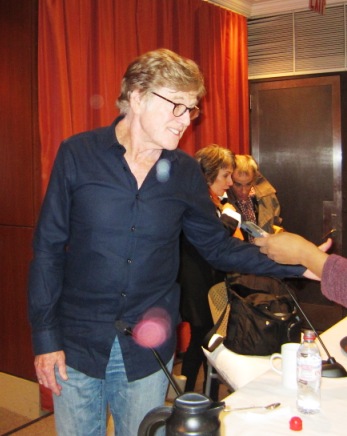 Jackie,
youíre the newcomer to this group of experienced actors. Youíre
best known as a singer. What led you to acting?
Jackie,
youíre the newcomer to this group of experienced actors. Youíre
best known as a singer. What led you to acting?
Robert Redford:
I
donít mean to [interrupt]. But, itís a wonderful story.
Itís one of those stories where you take a risk and it pays off.
And then Iíll let Jackie speak for her view. I was in Vancouver
getting ready to film. I couldnít find the young actress, the 11
year old to play my new daughter. Kids in films to me has always
been a big deal, because Iíve always wanted to see a child who can
just be and not act. So I was frustrated in the interview process
because I was interviewing girls who were lovely. They were fine.
Their mothers would bring them in. Their mothers were dressed like
they wanted a part in the movie. So there was that. Then kids were
too busy acting. I was getting [frustrated]. I said, thereís
nobody here. Theyíre talented, theyíre skilled, but theyíre
acting. I just wanted to somebody to just be. I was very
frustrated. We were going to start filming Thursday. Itís Saturday
night. Iím sitting in the hotel room depressed, surfing, mindlessly
surfing and suddenly boom! Thereís this vision on the
screen, this angelic creature that was 11 years old. I said whoa,
wait a minute whatís this? I donít watch much television. I looked
at it and said wait a minute, whatís this? Sheís singing Puccini.
Iím thinking: wait a minute, how does that work? The camera pulls
back and thereís this symphony hall and thereís this huge
orchestra. This symphony hall, this little lady is there just
belting this music out that was so powerful. Right away something
just clicked into gear, because I was desperate, and I said wait a
second, somebody who has that composure who can do that in front of
that kind of audience in that kind of register with that kind of
complexity, maybe that could work. To make a long story short I
contacted the casting person. I said, find out who this person
[is], where she is. They found out she was in Pittsburgh with her
parents. Lived a normal life in Pittsburgh, except she had to do
these shows. They went out and taped her. I donít think they knew
what was going on. Jackie can speak to that. They sent the tape
back. It was clear she didnít know what was going on. I said "I
donít care thereís something going on, Iím going to take this
chance." She was hired on Tuesday. She came, we filmed Wednesday.
We filmed the first day I met her. Let me tell you from that point
on, I figured from that point on I figured Iím one lucky man because
she turned out to be absolutely lovely. She just swung in. We just
played together. We just became people who could play and have fun
and improvise together. I ended up the beneficiary of a risk taken
and Jackie was worth it.
Jackie Evancho:
To be
honest I really donít know what to say. (laughs) All I can
say is that I was extremely honored to have a chance to actually act
with you guys. I was really excited that I got the role. I just
really had a lot of fun so thank you.
Robert Redford:
Thank
you.
Stanley Tucci:
Were you nervous the first day?
Jackie Evancho:
I was extremely nervous. I didnít know what to think.
Robert Redford:
She
was nervous, but she was so busy having fun, it disguised her
nervousness.
You were only 11
when you got the part. Did you even know who Robert Redford was?
Jackie Evancho:
Well, my dad, he always talked about it with his brothers. Heíd
just joke around and stuff. So when I heard the name I wasnít very
familiar with it. I shouldnít say it, itís an amazing name, Iím
sorry. (laughs) The only thing that I knew was that my dad,
heís like, "He played a cowboy." Thatís all I knew. But I
actually thought it was an amazing honor, so thank you, sorry.
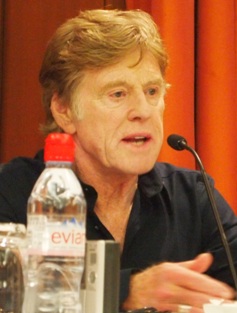 What
do you want people in the 21st century to take from this movie about
the legacy of The Weather Underground?
What
do you want people in the 21st century to take from this movie about
the legacy of The Weather Underground?
Robert Redford:
Well, there are probably a number of things that I would like to
take away. To simplify it, I would say that probably the first
thing would be it to make you think. Some films are made not to
necessarily think, but it's like eating cotton candy. You have a
wonderful ride then its over and thatís all that you really want.
Other films are designed in a way to at least make you ask a
question afterwards or think about whatís happened or maybe dialogue
with someone. I think thatís what I would prefer. Itís not always
possible. That would be the first thing. The second thing has to
do with a criticism I have for my own country. I donít think weíre
very good at looking at history as a lesson to be learned so that we
donít repeat a negative historical experience. Weíre not good at
that. Looking back in time to say this happened then, what did we
learn from that? I just think itís an American tradition to be so
busy pushing forward, driving forward, doing, doing, doing. They
donít look back and say "Gee, what can I learn from mistakes I made
before?" So I guess the hope, thatís all it can be is a hope, is
you look back at this moment in time. By the way when this
happened, I was of that age. I was of them in spirit. But because
I was starting a career in the New York theater as an actor
Ė
and I
was also starting to have a family. I was obligated to that task. So
I wasnít a part of it. But I was certainly empathetic to what they
were doing, because I also thought it was a wrong war. I thought it
was a war that was going to cost unnecessary lives. It was also a
war designed by people who had never gone to war. It had a lot to
do with a tragic history of the United States and the mistakes its
made they never seem to learn by. So that was my own personal
criticism about my country. I would hope that you look back and
itís not about what happened then. Itís about 30 years later.
Thereís a wonderful poem by Yeats, one of my favorite poems. In
that poem, thereís a line that says, "Because he was so sick of what
was happening to Ireland, he could see that calm Ireland was about
to be disrupted by Evangelism, by revolt, by revolution and that
Ireland would never be the same." So he was bemoaning that by
taking a conservative stance. He says ďThe best do lack conviction,
and the worst are full of passion and intensity.Ē I thought that
was a nice thing for me to play with. As people who were filled
with that passion and intensity grow older and look back, they are
trapped by their past, because in order to stay free from the law,
they go underground, with a false name. But how long can you live
without your true identity? Thatís what interested me, to tell that
story, not then but now.
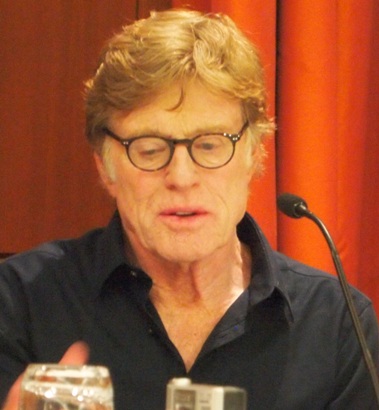 The
movie is one of your first forays into the new world of journalism.
These days there is no "fair and balanced," itís mostly very far
right or very far left. Were you trying to explore that dynamic?
The
movie is one of your first forays into the new world of journalism.
These days there is no "fair and balanced," itís mostly very far
right or very far left. Were you trying to explore that dynamic?
Robert Redford:
Itís
tricky business when an artist starts to mess around with
journalism. Iíve done that before. Basically, I was protected by a
story that was written by somebody else and I was just documenting
that. But itís tricky because I donít know that the media is
comfortable being criticized by people who are not in their own
world. I donít know. I might be wrong. Itís just a hunch. In
other words you have to be careful. On the other hand because I
have such a keen interest in the media. I think it plays
such an important role in our society, Iím very concerned if itís
ever threatened in any way. If it is threatened I would like to
know how and what and maybe thatís a story. The internet has so
drastically altered the landscape of journalism. Now youíve got so
much information, I think there sometimes is too much information.
How do you find the truth? Where does a public citizen find the
truth when so much is coming at him? As you said, you have the far
right and far left hammering stuff. Much of it is lying, bubble
[stuff]. So the public maybe gets fed up and turns away and then I
think thereís real danger. Iím really curious about the state of
journalism, where it is right now. Whatís going on. In terms of
this film, I really saw the Shia character, I guess to me there was
a little bit of a hint of a story that Iíve always loved. There
were two stories that I always loved as a kid, The Phantom of the
Opera Ė Iíve always wanted to play that part Ė and then Les
Misťrables. I just thought from the time I was a little kid
that was one of the great stories. I saw similarities in that Shia
LaBeoufís character is Inspector Javert from Les Misťrables
and I am Jean Valjean Ė in a sense that I go to prison for something
Iíve done thatís wrong. I escape. I take on a new identity to
escape prison time. I live a clean life. I have a daughter. The
daughter means everything to me. Jackie. I had to give up another
daughter before she meant too much to me to give up. Brit. That
was painful. I donít want to make that same mistake again. So here
it is, this means everything to me. Yet thereís someone on my tail
who might expose me in a way that makes it impossible for to have
the true love of my daughter and live a clean, clear life. That was
the complexity that sparked me to make this film.
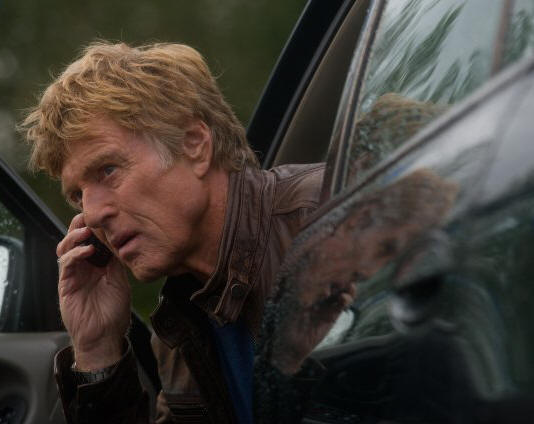 Did you meet any
of the members of the Weather Underground or similar groups when
preparing the film?
Did you meet any
of the members of the Weather Underground or similar groups when
preparing the film?
Robert Redford:
No.
I didnít feel I needed to because I saw a documentary several
years over that came to the festival called The Weather
Underground. I was already aware of it early. I felt that that
documentary was very well made about the actual people: Mark Rudd,
Bernardine Dohrn. I didnít feel I needed to meet them. Also this
was a piece of fiction that had to have a piece of truth to it but
it was really about their lives later. So, no, I didnít feel I
really needed to, because I thought I had a firm description of them
presented. But I did meet the son of Bernadine Dohrn and Bill Ayers
who lives here in New York and Chicago. Heís a teacher and I met
him. That was it. I figured I didnít want to go to far into it
because this is a piece of fiction, in a sense. Itís dramatic
fiction. I want to be able to take it on but used as the basis of
who these people really were. The characters. No, I did not want
to meet them.
Would you want to
meet them now?
Robert Redford:
No. I
think weíre all moving on. We work. We do something. If you stay
with something too long itís probably not a good thing. Iím happy
to talk about this film because Iím proud of it. Iím proud of the
actors who are in it. I was able to make the film I wanted, the way
I wanted to make it, so Iím proud of that. But if you stay
too long, itís not a good thing.
You took a wink
in this film to some of your earlier photos.
Robert Redford:
(laughs)
You think thatís a wink?
How did you
decide to use them to give the film a feel of history?
Robert Redford:
Itís
not terribly interesting. I just had to go through archival stuff
and find old photos of myself and be depressed. Like Iíve got to
live up to this. There was I know a photo from Jeremiah Johnson.
I had to put outfit from The Candidate on the face, that was
kind of interesting. But it was just something that was right for
the film to show time passes, people age.
Did you have to
find an old prison shot for your mug shot?
Robert Redford:
No,
there were times I could have but I didnít.
It sort of
reminds me of a great line from the film, when Nick Nolte says "We
all died. Some of us came back."
Robert Redford:
Itís a
great line.
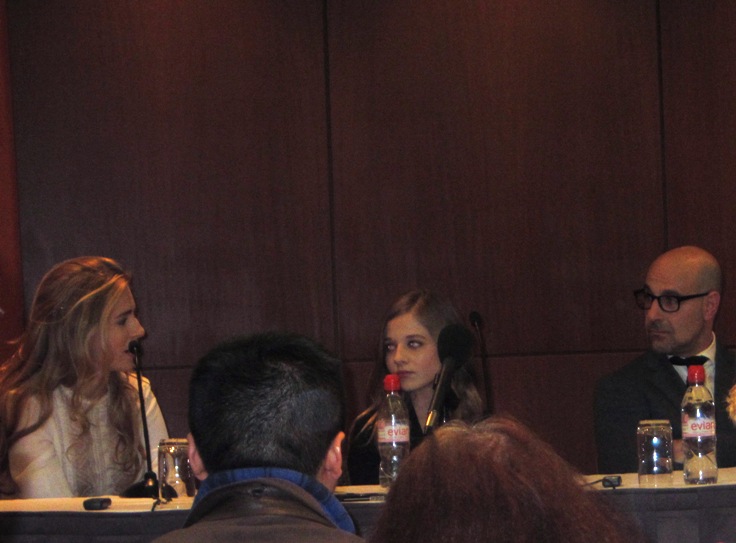 As
part of the Vietnam era, Mr. Redford and Mr. Tucci, did you draw
from that era for the roles?
As
part of the Vietnam era, Mr. Redford and Mr. Tucci, did you draw
from that era for the roles?
Robert Redford:
I
think Iíve already said enough. Iíd love Stanley to take
that one and Iíll see what his opinion is.
Stanley Tucci:
Well,
I was four years old, so I didnít, I couldnít. I know I look a lot
older, thanks very much. I think weíre done here. (laughs)
No, I didnít have anything personal to draw on. Only having talked
to people who were in the war. I have a cousin who fought in the
war, who was there for two terms. And people Iíve met and things
Iíve read. Also as I said before when you approach certain films if
itís there on the page, which it was here, sometimes thatís really
all you need. I think after youíve been doing it for a long period
of time, sometimes you do need a lot of preparation and research but
certainly for this role it was all really there.
Brit and Jackie,
what would be the first question you would ask Robertís character of
Jim Grant, coming from different generations?
Brit Marling:
Oh
wow. Thatís a really good question. I guess it would be
interesting to know what someone would think about radicalism now.
What was so exciting about Weather Underground was that these things
werenít necessarily happening to those kids. They were
predominantly from affluent suburban families and they maybe knew
someone who went [to war], but they felt a sense of radical
accountability for what their country was doing. I wonder where
that sense of radical accountability is in my generation. How come
we donít feel the same responsibility to be the voice of change, and
to stand up for the things we say that we believe in? I donít know
what he would say about that. (laughs)
Robert Redford:
I was
thinking about that time 30 years ago and the commitment that young
people had. It was a young peopleís movement. Iím imagining you...
I think I know you well enough to know you would have been somehow
connected. But that generation came so close to accomplishing, so
close to get to the final point of destination, and then collapsed
before they got there. Itís a movement that kind of ate itself.
You went, oh! I just wish they had gone one step further. They
were so close as a generation as we know now. Now itís 30 years
later, your generation is Occupy Wall Street and other
organizations. Iím curious what your personal views are about that
movement, and the fact that it was similar [trajectory], it came
close.
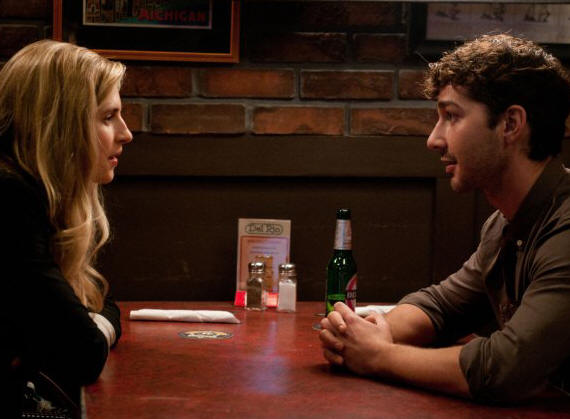 Brit Marling:
It
didnít quite make itÖ Itís funny, Zal [Batmanglij] and I, who is a
filmmaker I work with, we were writing something at the time that
was about the sort of Occupy movement before Occupy happened. We
were about a week away from shooting this film when Occupy Wall
Street happened, and we were like, "Oh, great. Someone has finally
tapped into the collective unrest and given it a voice and is
organizing." But I think what maybe happens is all these ideas come
up, and then whatís the action? A lot of young people, I watched
them leave their jobs and go knock on doors for Obama. They were so
excited about the possibility of change. But then once he was
elected, itís not like they walked away from their jobs and took to
the streets and gave him a mandate for change. I donít know why the
Occupy movement crested then didnít quite take over but one gets the
sense that so many people are so comfortable, that the impact isnít
on them on a daily basis. And so theyíre unwilling to walk
away from the lovely coma of their daily lives to really, really
stand behind change. But I still think itís very, very possible.
Maybe my generation is sort of straddling one foot in being an
anarchist another foot in playing by the rules. Leading within the
system and trying to change the system from within. I donít know
what happens the more progress that makes. Do you eventually have
to pick a side? Do you fall in between the chasm in the middle?
Iím not sure. I wrestle with that everyday.
Brit Marling:
It
didnít quite make itÖ Itís funny, Zal [Batmanglij] and I, who is a
filmmaker I work with, we were writing something at the time that
was about the sort of Occupy movement before Occupy happened. We
were about a week away from shooting this film when Occupy Wall
Street happened, and we were like, "Oh, great. Someone has finally
tapped into the collective unrest and given it a voice and is
organizing." But I think what maybe happens is all these ideas come
up, and then whatís the action? A lot of young people, I watched
them leave their jobs and go knock on doors for Obama. They were so
excited about the possibility of change. But then once he was
elected, itís not like they walked away from their jobs and took to
the streets and gave him a mandate for change. I donít know why the
Occupy movement crested then didnít quite take over but one gets the
sense that so many people are so comfortable, that the impact isnít
on them on a daily basis. And so theyíre unwilling to walk
away from the lovely coma of their daily lives to really, really
stand behind change. But I still think itís very, very possible.
Maybe my generation is sort of straddling one foot in being an
anarchist another foot in playing by the rules. Leading within the
system and trying to change the system from within. I donít know
what happens the more progress that makes. Do you eventually have
to pick a side? Do you fall in between the chasm in the middle?
Iím not sure. I wrestle with that everyday.
Robert Redford:
Itís
interesting what you said. You said itís a possibility. Thatís
what your screen mother says in the film. Julie Christie says in
her argument, the argument isnít saying it is over, youíre wasting
my time. Sheís saying no, itís never over. As long as the cause is
there, then the reason to revolt is there. Itís a good point. Even
though time goes on. We were having that debate which I think was
structured in such a way that the audience would have that
discussion. But for you, you wanted something to happen that was
the voice of your generation. One of the things thatís beautiful
about Brit and was such a joy to work with is whatever she does,
whatever role she plays thereís always the truth. Sheís a person of
supreme truth. Whatever sheís doing, truth just comes through.
Thatís such a valuable asset. I felt that when we met, when we
first talked. I felt that in her work we saw at the festival. To
be able to let that happen in a film, to give it over to her,
anything I did or said was just like: take it and go with it. I
know whatever you do the truth is going to come out. Thatís going
to be a powerful force against what Shia was playing with. So I
would think that maybe Brit, I felt the same way when I was young.
I was disappointed that something wasnít reached, because it was my
generation, my voice. I wanted it to succeed. We felt it was about
the truth. We felt we were not being told the truth as a country,
so we wanted to be the voice of truth. The fact that we couldnít
make it was kind of disappointing. I see Brit as an ambassador for
her generation.
What would you
ask Jackie?
Jackie Evancho:
A lot
of things. I probably would have asked where you were, what
you were doing and why you left. (laughs)
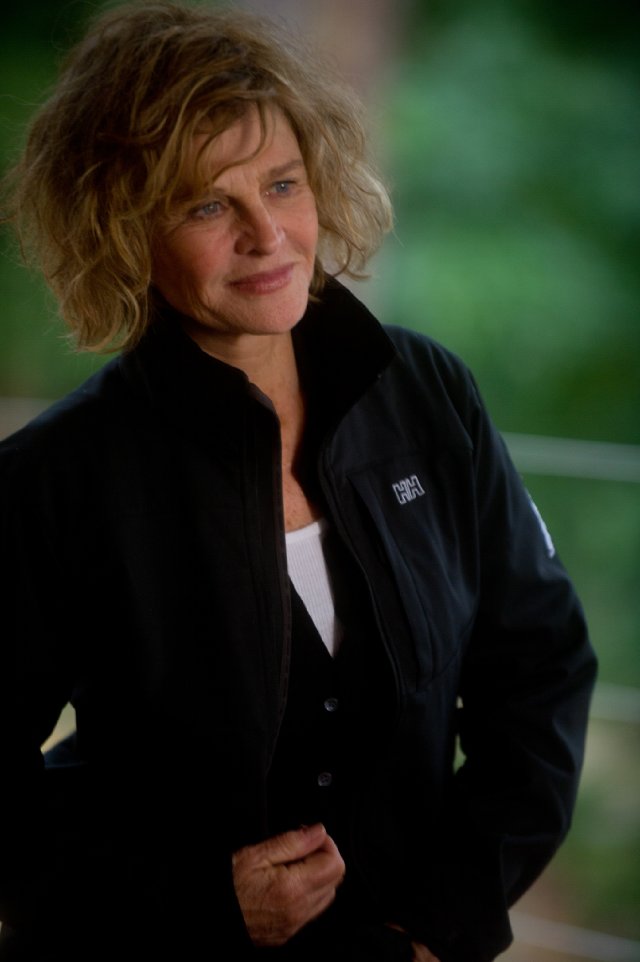 Julie Christie is
amazing in her role. Are you going to try to get her an Oscar
nomination?
Julie Christie is
amazing in her role. Are you going to try to get her an Oscar
nomination?
Robert Redford:
I
would never try to get somebody an Oscar nomination. Thatís not my
business. Awards are not my business. But Julie became my
business. I saw her because I knew her when she was younger. We
were from the same age. We both had film exposure around the same
time. I realized that she was radical then and assumed she might
stay that way. That would be something to draw on. But I had no
idea beyond that. I saw a film she made... she seemed to disappear
from the face of the Earth and then she showed up in a film about
Alzheimerís [Away From Her]. I thought unless that was a
real life thing for her maybe I should call her. It took a while to
get her. Sheís remote. Sheís in a remote area of Spain and
sometimes London. It took two months of conversations, first of all
trying to find her, Secondly listening to her telling me why she
shouldnít do it. She didn't want to, didnít think she could do it.
Perseverance ruled the day. She finally came and did it and well,
I think the effort should speak for itself.
Terrence Howard
was terrific playing against type as the FBI agent. How did you
pick him for the role?
Robert Redford:
Well,
Terrence, I think he is a wonderful actor. He was in a film we had
at our festival called Hustle and Flow. Thatís when I first
met him, and I thought he was really good. So I wanted him in the
role. I wanted him as an actor in that role. No other reason.
Iím glad he did it. He did a good job.
You compared your
character to Jean Valjean. Jean Valjean paid a price when Javert
started hunting him, his freedom. What did your character Jim Grant
have to pay?
Robert Redford:
The
price I pay is the idea that Iím going to have to give up the life
Iím leading under my false name to have my real name, so my
relationship with my daughter can be clean and pure. And what that
cost is going to be. What is the cost to have to reveal that at
that point in time? Particularly, if you've seen the film, you know
that I was innocent of the crime, but Iím not seen as innocent. Iím
seen as guilty. The only way I can clear my name is by getting to
Julie Christie. The run is almost impossible. The odds are totally
against him. The reason heís able to buck those odds is the because
of love of his daughter. He wasn't able to love his first daughter,
Brit. Although had I known Brit was going to play it, we probably
would have had a whole different story. He is all about redemption
and digging yourself out and you sometimes have to face a hard truth
in order to do it. So I think that what he had to do was in order
to be able to face his daughter and live a clean, honest life, there
was going to be some damage he would have to repair but the damage
was worth not having to lie.
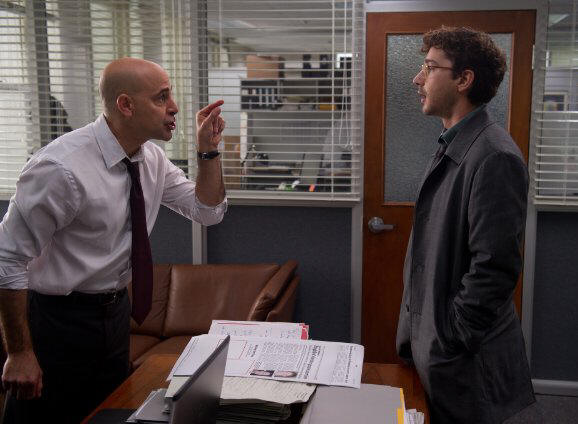 This film has
some aspects of some of your classic films: family drama like
Ordinary People, thriller aspects like your work with Sydney
Pollack (like Three Days of the Condor) and journalism like
All the Presidentís Men. Did it help to sell you on this project
that all of those were present?
This film has
some aspects of some of your classic films: family drama like
Ordinary People, thriller aspects like your work with Sydney
Pollack (like Three Days of the Condor) and journalism like
All the Presidentís Men. Did it help to sell you on this project
that all of those were present?
Robert Redford:
It
helped in the sense that it enabled me to put them all together in
one film. I made those films for specific reasons relating to those
specific areas in our culture. To be able to see a chance to
combine them all into one film and have the relationship with the
reporter and Stanleyís character, the editor drive the story.
Because they are the driving force of the story. "Get the story.
Get the story. Donít make mistakes. Be cool." That has itís own
energy and thatís driving the engine. Thatís the journalism part.
Then you have the thriller part, the man on the run to save his life
and his daughter. Then you had the family, because thatís what it
was about. It was about a manís chance to finally, after he had
failed before, to have a real life and family, except he was haunted
by his past. To answer your question, it was a chance to put all
three together in one.
Did making this
movie give you any positive thoughts about the state of journalism?
Robert Redford:
Positive? I donít know about positive as much as valuable. Because
I consider journalism so valuable that Ė I don't want to show too
much ego here, but I would almost take it personally if journalism
failed itself. Thatís the one avenue we have to the truth. So if
Iím going to portray journalism in a film itís a tricky business.
You want to at least give it itís due. Maybe describe the threats
that are against it. In this case the idea of Shiaís character was
to me more interesting, it was complicated by the fact of is he
going after the story for his own personal aggrandizement or is he
going after it purely to save his story? There is a dance between
that as he moves forward. What should be unmistakable is what he
learns about himself in the end. In his pursuit of finding somebody
else, what does he learn about himself that may change him? That
was exciting to me, but you have to be careful. You really have to
be careful about when dealing journalism about trying to be pedantic
or academic about it. You have to touch certain things then back
away and let the audience go with it and figure it out.
CLICK
HERE TO SEE WHAT ROBERT REDFORD HAD TO SAY TO US IN 2005!
CLICK HERE TO SEE WHAT
ROBERT REDFORD HAD TO SAY TO US LATER IN 2013!
CLICK
HERE TO SEE WHAT STANLEY TUCCI HAD TO SAY TO US IN 2010!